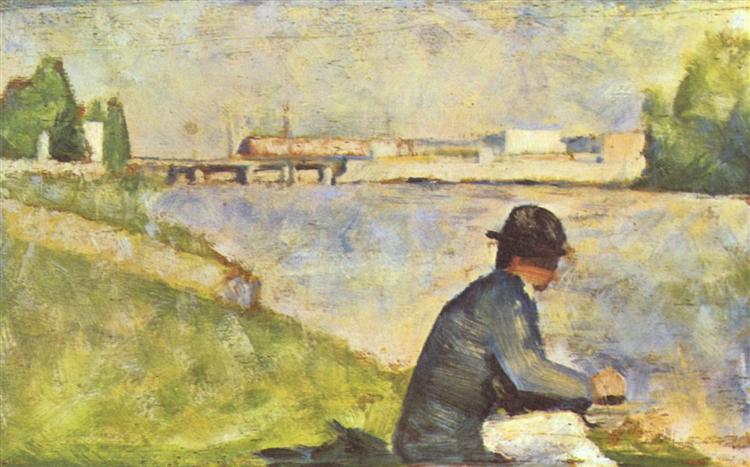Description
In the work "Sitting Man. Study for 'Bañistas in Asnières'" (1883), Georges Seurat presents a paradigmatic example of his innovative focus on painting, which would eventually consolidate as the starting point of neo -impressionism. This study is a piece of transition and fundamental condition in the development of its famous final work, "bathers in Asnières", where Seurat explores not only the representation of the human figure, but also the principles of color and light through the Puntillismo technique that characterizes his work.
The composition of this work is, at first glance, quiet and contemplative. The figure of the seated man is positioned focused on the painting, Captured in a moment of pause. Its relaxed posture, in a natural area, suggests both introspection and a connection with its environment. Seurat, in this study, focuses on the construction of volume and three -dimensionality through the use of light and shadow, techniques learned from the academic study of painting, but taken to the field of modern representation. The figure is dressed in a white shirt, which stands out against the darkest background, highlighting the artist's interest in the interaction between the figure and the surrounding space.
The colors used are characteristic of Seurat's palette: a combination of earthly tones mixed with blue blue and green, which result in an atmosphere of calm and serenity. The background, although less detailed than the figure of man, reveals dense vegetation and a context that evokes the life of the Parisian periphery, a recurring theme in his work. The use of small subtly applied color brushstrokes, anticipates its subsequent exploration of the point, where each color point builds the image and creates a vibrant visual interaction.
The figure of man in this painting can be interpreted as a symbol of the new leisure of the emerging middle class in the Paris of the late nineteenth century, which also reflects Seurat's social interest in the activities of his contemporaries. By discussing such a daily issue, Seurat moves away from the great historical or mythological stories, focusing his gaze on the modern landscape and the simple interactions of people.
As a study, "sitting man" also offers a valuable vision of the artist's creative process. Seurat is known for his meticulousness and intense preparation before executing a major work. This outline reflects its search for harmony between the figure and the environment, as well as its desire to capture the essence of the fleeting moment, a goal shared by many of its contemporaries, but which he addressed from a scientific and structural angle. The study is not only related to "bathers in Asnières", but also to other works of the time, where modernity and advances in pictorial technique play a crucial role.
This work must not be valued only in its technical context, but also in its ability to generate an emotional connection with the viewer. The lonely figure seems to invite us to reflect on the relationship between the individual and his environment, an issue that will reverberate in Seurat's work throughout his career. Thus, "Sitting Man. Study for 'Bañistas in Asnières'" is not just one step towards the realization of his most famous work, but also stands as a testimony of the ingenuity of an artist who sought to capture modernity in a unique way and exciting.
KUADROS ©, a famous paint on your wall.
Hand-made oil painting reproductions, with the quality of professional artists and the distinctive seal of KUADROS ©.
Reproduction service paintings With a guarantee of satisfaction. If you are not completely satisfied with the replica of your painting, we refund your money 100%.

